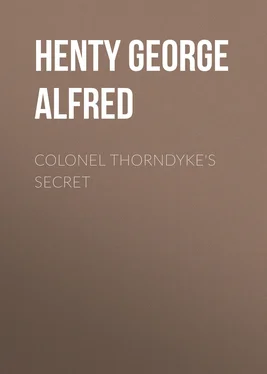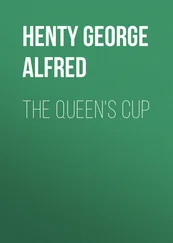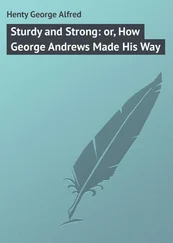George Henty - Colonel Thorndyke's Secret
Здесь есть возможность читать онлайн «George Henty - Colonel Thorndyke's Secret» — ознакомительный отрывок электронной книги совершенно бесплатно, а после прочтения отрывка купить полную версию. В некоторых случаях можно слушать аудио, скачать через торрент в формате fb2 и присутствует краткое содержание. Издательство: Иностранный паблик, Жанр: foreign_prose, Классический детектив, foreign_detective, foreign_antique, на английском языке. Описание произведения, (предисловие) а так же отзывы посетителей доступны на портале библиотеки ЛибКат.
- Название:Colonel Thorndyke's Secret
- Автор:
- Издательство:Иностранный паблик
- Жанр:
- Год:неизвестен
- ISBN:нет данных
- Рейтинг книги:4 / 5. Голосов: 1
-
Избранное:Добавить в избранное
- Отзывы:
-
Ваша оценка:
- 80
- 1
- 2
- 3
- 4
- 5
Colonel Thorndyke's Secret: краткое содержание, описание и аннотация
Предлагаем к чтению аннотацию, описание, краткое содержание или предисловие (зависит от того, что написал сам автор книги «Colonel Thorndyke's Secret»). Если вы не нашли необходимую информацию о книге — напишите в комментариях, мы постараемся отыскать её.
Colonel Thorndyke's Secret — читать онлайн ознакомительный отрывок
Ниже представлен текст книги, разбитый по страницам. Система сохранения места последней прочитанной страницы, позволяет с удобством читать онлайн бесплатно книгу «Colonel Thorndyke's Secret», без необходимости каждый раз заново искать на чём Вы остановились. Поставьте закладку, и сможете в любой момент перейти на страницу, на которой закончили чтение.
Интервал:
Закладка:
In summer the work was done in the morning, but was not unfrequently broken. Mark went off at a very early hour to drive perhaps some twenty miles with his great chum, Dick Chetwynd, for a long day’s fishing, or to see a main of cocks fought or a fight between the champions of two neighboring villages, or perhaps some more important battle.
When Millicent Conyers was ten years old she came regularly into the study, sitting curled up in a deep chair, getting up her lessons while Mark did his, and then changing seats with him while he learned his Horace or Ovid by heart. At this time she looked up greatly to him, and was his companion whenever he would allow her to be, fetched and carried for him, and stood almost on a level with his dogs in his estimation. Five years later, when Mark was eighteen, these relations changed somewhat. He now liked to have her with him, not only when about the house and garden, but when he took short rides she cantered along on her pony by his side. She was a bright faced girl, full of life and fun, and rejoicing in a far greater amount of freedom than most girls of her age and time.
“It is really time that she should learn to comport herself more staidly, instead of running about like a wild thing,” Mrs. Cunningham said, one day, as she and the Squire stood after breakfast looking out of the open window at Mark and Millicent.
“Time enough, my dear lady, time enough. Let her enjoy life while she can. I am not in favor of making a young kitten behave like an old tabby; every creature in nature is joyful and frolicsome while it is young. She is as tall and as straight as any of her friends of the same age, and looks more healthy; she will tame down in time, and I dare say walk and look as prim and demure as they do. I was watching them the other day when there was a party of them up here, and I thought the difference was all to her advantage. She looked a natural, healthy girl; they looked like a set of overdressed dolls, afraid to move or to talk loud, or to stretch their mouths when they smile; very ladylike and nice, no doubt, but you will see Millicent will throw them into the shade when she is once past the tomboy age. Leave her alone, Mrs. Cunningham; a girl is not like a fruit tree, that wants pruning and training from its first year; it will be quite time to get her into shape when she has done growing.”
John Thorndyke had occasionally made inquiries of Mr. Bastow as to the whereabouts of his son. At the time the sentence was passed transportation to the American colonies was being discontinued, and until other arrangements could be made hulks were established as places of confinement and punishment; but a few months later Arthur Bastow was one of the first batch of convicts sent out to the penal settlement formed on the east coast of Australia. This was intended to be fixed at Botany Bay, but it having been found that this bay was open and unsheltered, it was established at Sydney, although for many years the settlement retained in England the name of the original site. As the condition of the prisoners kept in the hulks was deplorable, the Squire had, through the influence of Sir Charles Harris, obtained the inclusion of Bastow’s name among the first batch of those who were to sail for Australia. Mr. Bastow obtained permission to see his son before sailing, but returned home much depressed, for he had been assailed with such revolting and blasphemous language by him that he had been forced to retire in horror at the end of a few minutes.
“We have done well in getting him sent off,” the Squire said, when he heard the result of the interview. “In the first place, the demoralizing effect of these hulks is quite evident, and it may be hoped that in a new country, where there can be no occasion for the convicts to be pent up together, things may be better; for although escapes from the hulks are not frequent, they occasionally take place, and had he gained his liberty we should have had an anxious time of it until he was re-arrested, whereas out there there is nowhere to go to, no possibility of committing a crime. It is not there as it was in the American colony. Settlements may grow up in time, but at present there are no white men whatever settled in the district; and the natives are, they say, hostile, and were a convict to escape he would almost certainly be killed, and possibly eaten. No doubt by the time your son has served his sentence colonies will be established out there, and he may then be disposed to settle there, either on a piece of land of which he could no doubt take up or in the service of one of the colonists.”
CHAPTER V
The scene in the convict yard at Sydney, five years after its foundation as a penal settlement, was not a pleasant one to the lover of humanity. Warders armed to the teeth were arranging gangs that were to go out to labor on the roads. Many of the convicts had leg irons, but so fastened as to be but slight hindrance to their working powers, but the majority were unironed. These were the better behaved convicts; not that this would be judged from their faces, for the brutalizing nature of the system and the close association of criminals had placed its mark on all, and it would have been difficult for the most discriminating to have made any choice between the most hardened criminals and those who had been sent out for what would now be considered comparatively trivial offenses. The voyage on board ship had done much to efface distinctions, the convict life had done more, and the chief difference between the chained and unchained prisoners was that the latter were men of more timid disposition than many of their companions, and therefore less disposed to give trouble that would entail heavy punishment. But it was only the comparatively well conducted men who were placed upon road work; the rest were retained for work inside the jail, or were caged in solitary confinement. Each morning a number, varying from half a dozen to a dozen, were fastened up and flogged, in some cases with merciless severity, but it was seldom that a cry was uttered by these, the most brutal ruffians of the convict herd. This spectacle was just over: it was conducted in public for the edification of the rest, but, judging from the low laughs and brutal jests, uttered below the breath, it signally failed in producing the desired impression. Two of those who had suffered the severest punishment were now putting on their coarse woolen garments over their bloodstained shoulders; both were comparatively young men.
“I shall not stand this much longer,” one muttered. “I will brain a warder, and get hung for it. One can but die once, while one can get flogged once a week.”
“So would I,” the other said bitterly; “but I have some scores to settle in England, and I am not going to put my head in a noose until I have wiped them out. The sooner we make arrangements to get back there the better.”
“Yes, we have talked of this before,” the other said, “and I quite agreed with you that if we all had the pluck of men we ought to be able to overpower the warders, in spite of their firearms. Of course some of us would get killed, but no one would mind that if there was but the remotest chance of getting away. The question is what we should do with ourselves when we were once outside the prison. Of course I know that there are two or three hundred settlers, but there would not be much to be got out of them, and life among those black fellows, even if they were civil to us, which I don’t suppose they would be, would not be worth having.”
“We might not have to stay there long; ships with stores or settlers arrive occasionally, and if a lot of us got away we might seize one by force, turn pirates for a bit, and when we are tired of that sail to some South American port, sell our capture, and make our way home to England. If we were not strong enough to take her, we could hide up on board her; we should be sure to find some fellow who for a pound or two would be willing to help us. The thing can be done if we make up our minds to do it, and I for one have made up my mind to try. I haven’t chalked out a plan yet, but I am convinced that it is to be done.”
Читать дальшеИнтервал:
Закладка:
Похожие книги на «Colonel Thorndyke's Secret»
Представляем Вашему вниманию похожие книги на «Colonel Thorndyke's Secret» списком для выбора. Мы отобрали схожую по названию и смыслу литературу в надежде предоставить читателям больше вариантов отыскать новые, интересные, ещё непрочитанные произведения.
Обсуждение, отзывы о книге «Colonel Thorndyke's Secret» и просто собственные мнения читателей. Оставьте ваши комментарии, напишите, что Вы думаете о произведении, его смысле или главных героях. Укажите что конкретно понравилось, а что нет, и почему Вы так считаете.












